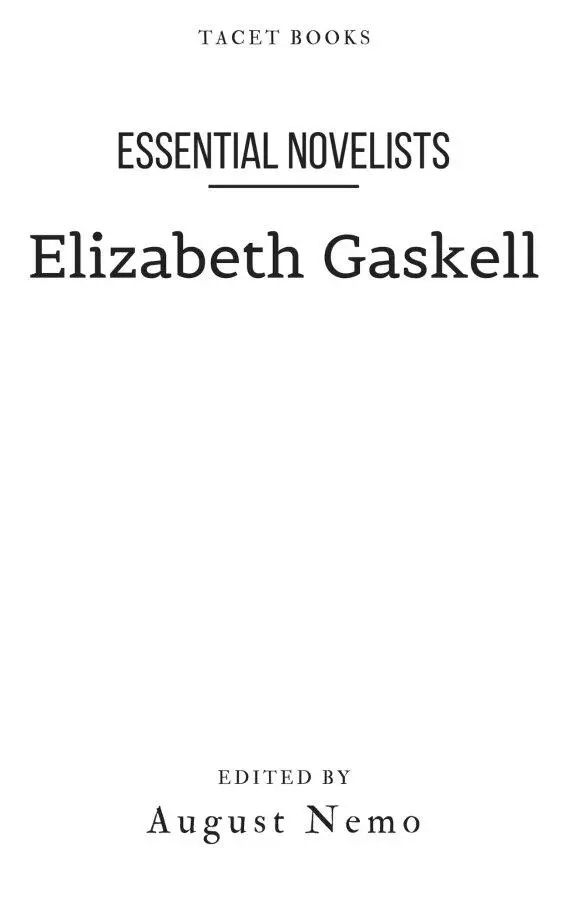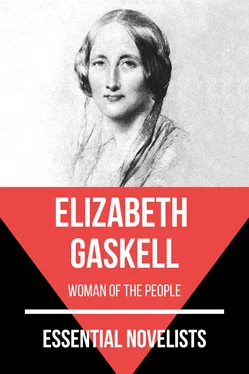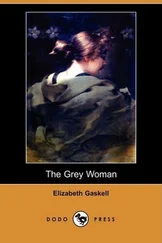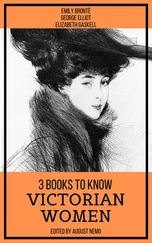
Title Page
Author
North and South
Mary Barton Конец ознакомительного фрагмента. Текст предоставлен ООО «ЛитРес». Прочитайте эту книгу целиком, купив полную легальную версию на ЛитРес. Безопасно оплатить книгу можно банковской картой Visa, MasterCard, Maestro, со счета мобильного телефона, с платежного терминала, в салоне МТС или Связной, через PayPal, WebMoney, Яндекс.Деньги, QIWI Кошелек, бонусными картами или другим удобным Вам способом.
About the Publisher Конец ознакомительного фрагмента. Текст предоставлен ООО «ЛитРес». Прочитайте эту книгу целиком, купив полную легальную версию на ЛитРес. Безопасно оплатить книгу можно банковской картой Visa, MasterCard, Maestro, со счета мобильного телефона, с платежного терминала, в салоне МТС или Связной, через PayPal, WebMoney, Яндекс.Деньги, QIWI Кошелек, бонусными картами или другим удобным Вам способом.
ELIZABETH CLEGHORN Gaskell (born Sept. 29, 1810, Chelsea, London, Eng.—died Nov. 12, 1865, near Alton, Hampshire), English novelist, short-story writer, and first biographer of Charlotte Brontë.
She was a daughter of a Unitarian minister. When her mother died, she was brought up by a maternal aunt in the Cheshire village of Knutsfordin a kindly atmosphere of rural gentility that was already old-fashioned at the time. In 1832 she married William Gaskell, a Unitarian minister, and settled in the overcrowded, problem-ridden industrial city of Manchester, which remained her home for the rest of her life. Domestic life—the Gaskells had six children, of whom four daughters lived to adulthood—and the social and charitable obligations of a minister’s wife claimed her time but not all her thoughts. She did not begin her literary career until middle life, when the death of her only son had intensified her sense of communitywith the poor and her desire to “give utterance” to their “agony.” Her first novel, Mary Barton, reflects the temper of Manchester in the late 1830s. It is the story of a working-class family in which the father, John Barton, lapses into bitter class hatred during a cyclic depression and carries out a retaliatory murder at the behest of his trade union. Its timely appearance in the revolutionary year of 1848 brought the novel immediate success, and it won the praise of Charles Dickensand Thomas Carlyle. Dickens invited her to contribute to his magazine, Household Words, where her next major work, Cranford(1853), appeared. This social historyof a gentler era, which describes, without sentimentalizing or satirizing, her girlhood village of Knutsford and the efforts of its shabby-genteel inhabitants to keep up appearances, has remained her most popular work.
The conflict between Mrs. Gaskell’s sympathetic understanding and the strictures of Victorian moralityresulted in a mixed reception for her next social novel, Ruth(1853). It offered an alternativeto the seduced girl’s traditional progress to prostitution and an early grave.
Among the many friends attracted by Mrs. Gaskell was Charlotte Brontë, who died in 1855 and whose biographyCharlotte’s father, Patrick Brontë, urged her to write. The Life of Charlotte Brontë (1857), written with warmhearted admiration, disposed of a mass of firsthand material with unforced narrative skill. It is at once a work of art and a well-documented interpretation of its subject.
Among her later works, Sylvia’s Lovers (1863), dealing with the impact of the Napoleonic Warsupon simple people, is notable. Her last and longest work, Wives and Daughters (1864–66), concerning the interlocking fortunes of two or three country families, is considered by many her finest. It was left unfinished at her death.

Chapter I
'Haste To The Wedding'
––––––––
'WOOED AND MARRIED AND a'.'
'Edith!' said Margaret, gently, 'Edith!'
But, as Margaret half suspected, Edith had fallen asleep. She lay curled up on the sofa in the back drawing-room in Harley Street, looking very lovely in her white muslin and blue ribbons. If Titania had ever been dressed in white muslin and blue ribbons, and had fallen asleep on a crimson damask sofa in a back drawing-room, Edith might have been taken for her. Margaret was struck afresh by her cousin's beauty. They had grown up together from childhood, and all along Edith had been remarked upon by every one, except Margaret, for her prettiness; but Margaret had never thought about it until the last few days, when the prospect of soon losing her companion seemed to give force to every sweet quality and charm which Edith possessed. They had been talking about wedding dresses, and wedding ceremonies; and Captain Lennox, and what he had told Edith about her future life at Corfu, where his regiment was stationed; and the difficulty of keeping a piano in good tune (a difficulty which Edith seemed to consider as one of the most formidable that could befall her in her married life), and what gowns she should want in the visits to Scotland, which would immediately succeed her marriage; but the whispered tone had latterly become more drowsy; and Margaret, after a pause of a few minutes, found, as she fancied, that in spite of the buzz in the next room, Edith had rolled herself up into a soft ball of muslin and ribbon, and silken curls, and gone off into a peaceful little after-dinner nap.
Margaret had been on the point of telling her cousin of some of the plans and visions which she entertained as to her future life in the country parsonage, where her father and mother lived; and where her bright holidays had always been passed, though for the last ten years her aunt Shaw's house had been considered as her home. But in default of a listener, she had to brood over the change in her life silently as heretofore. It was a happy brooding, although tinged with regret at being separated for an indefinite time from her gentle aunt and dear cousin. As she thought of the delight of filling the important post of only daughter in Helstone parsonage, pieces of the conversation out of the next room came upon her ears. Her aunt Shaw was talking to the five or six ladies who had been dining there, and whose husbands were still in the dining-room. They were the familiar acquaintances of the house; neighbours whom Mrs. Shaw called friends, because she happened to dine with them more frequently than with any other people, and because if she or Edith wanted anything from them, or they from her, they did not scruple to make a call at each other's houses before luncheon.
Читать дальше
















